Digital solutions: Which one best suits your business
Doing business online has become almost an imperative since the start of the COVID-19 pandemic. Now, more than ever, your business is relying on your digital assets. And to manage them – you’ll need a set of proper digital products.
There are various different commercial and open-source software platforms and digital products, but which one suits your business best?
When talking about digital products, the first thing that comes to mind may be some web or mobile application. Although these apps may be huge revenue generators for your business, there are some other tools and products you didn’t even know you can use.
And if you’re looking for a reliable solution partner to provide you with high-quality digital products and solutions, we’d be happy to help. We’re development experts for the Pimcore platform and we’d happily offer you our services of Pimcore development and turn your idea into a business project!
What is open-source software and why should I understand it?
Open-source software has available source code for download. This enables skilled software development companies or individuals to inspect, modify and enhance code to suit the needs for your business.
Here are some of the benefits you’ll experience if you decide to go with open-source software:
- Reduced cost while adding value – Open source software usually doesn’t require any usage fees, but you’ll need a skilled development team to edit the software to your needs. Adding new features and functionalities is not costly, so there’s no need to worry about this particular issue.
- Security – Open source software is usually very secure, thanks to the continuous reviews and evaluations by the community.
- Stability – For an open-source software to become unstable, a great disruption needs to happen in the community in a short amount of time. Now, that’s highly unlikely.
- Community – Open source software makes it easier for developers and users to form a community around the product. Every community member can tweak, manage, and upgrade the code, meaning that problems are resolved faster – and upgrades too
- Add your own features for your needs – Your development team can create unique features for your business exclusively. Such unique features make sure that your business processes are going smoothly, but honestly, it really depends on what kind of feature the developers build.
Is open-source software better than commercial software?
A great question!
When paying a publisher for a software license, you’re dependent on them for any updates, upgrades, and maintenance. On the other hand, when using open-source software, the community aspect holds a huge value and provides you with continuous support.
In short, even if you hired one company to develop open-source software, you can hire a different one to upgrade or maintain your software.
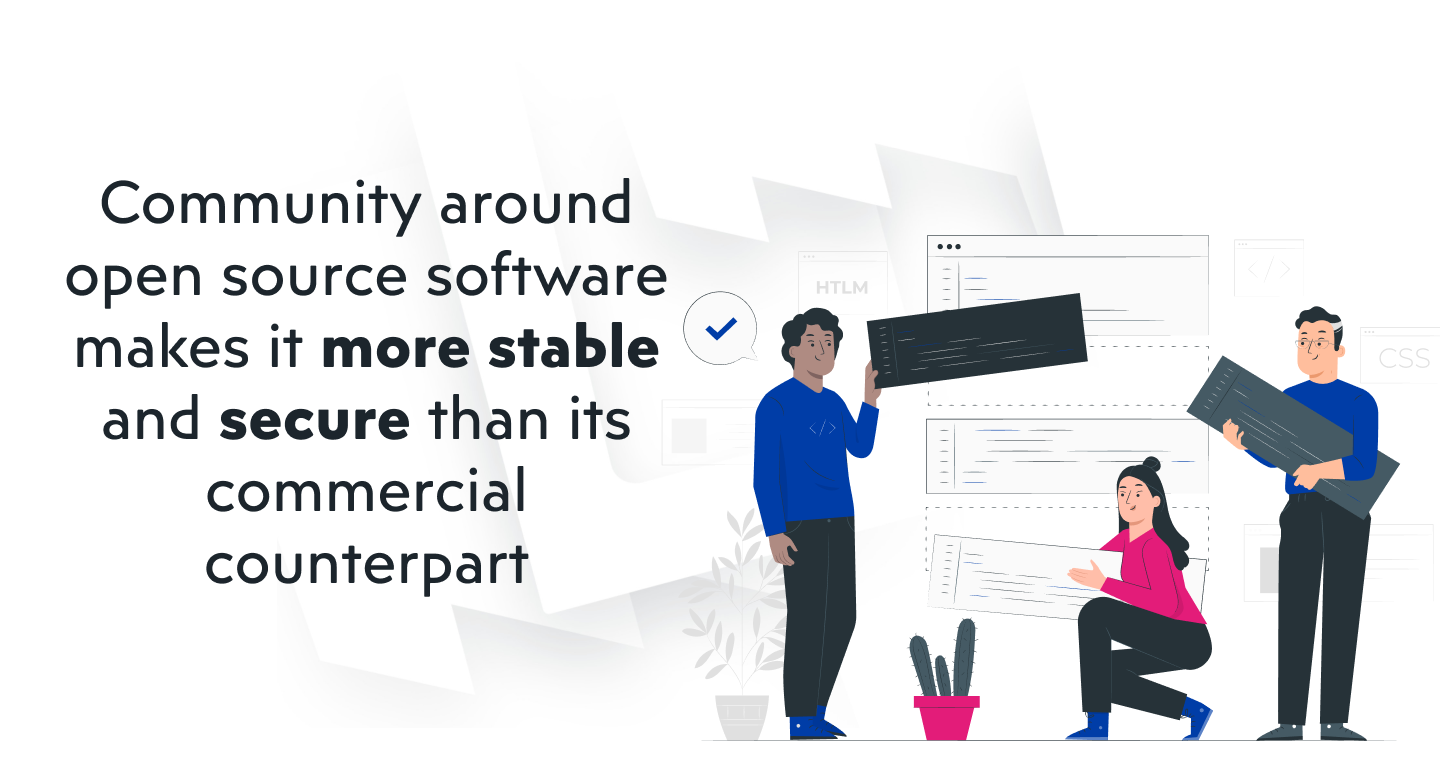
And does open-source software pay off? It certainly does! According to Statista, the projected revenue of open source services is projected to rise to 32.95 billion dollars in 2022. Be sure to consider choosing an open-source software solution, as there are numerous benefits behind each one of them!
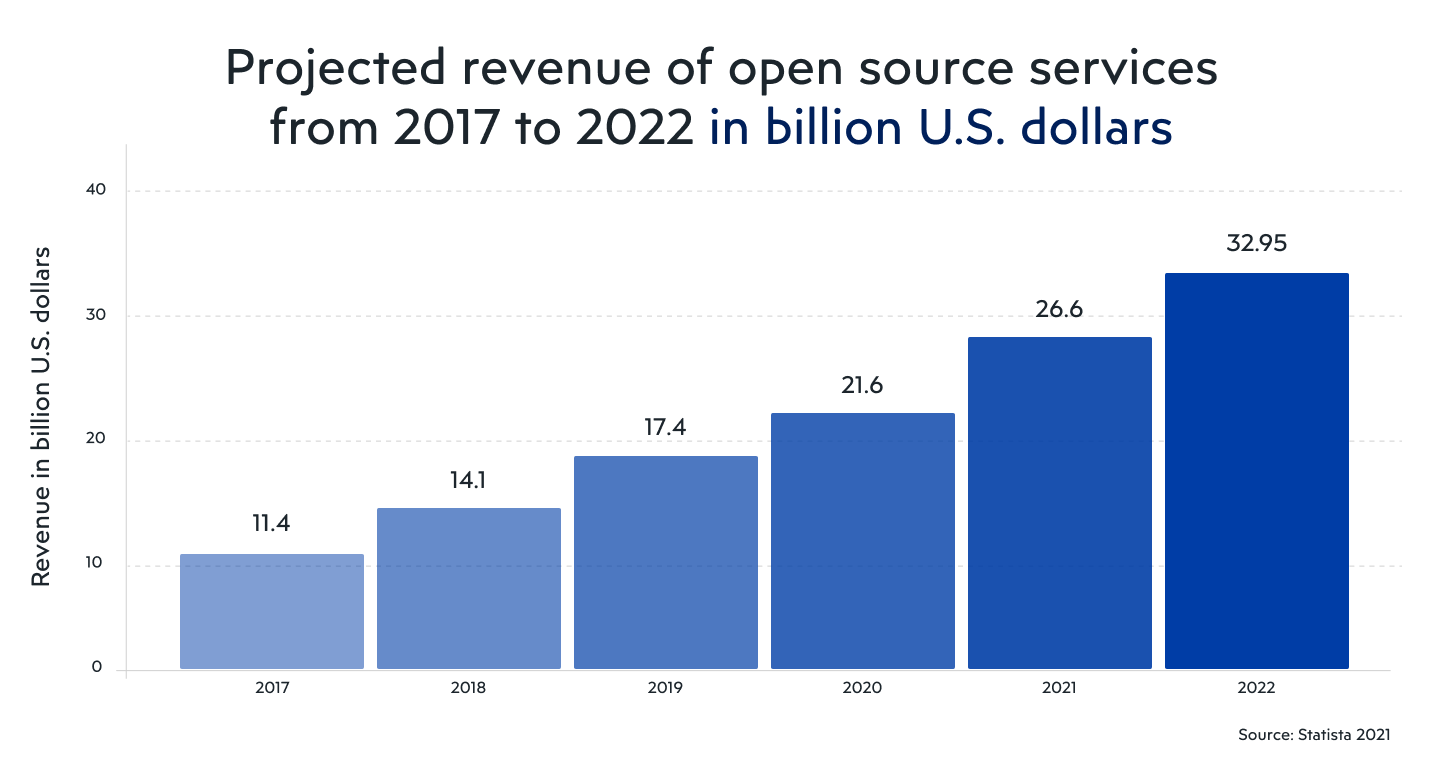
Let’s dive into what digital products can help your businesses thrive.
Open-source eCommerce solutions
Generally, eCommerce operates on a few different business models, with the most common being:
- B2B – business to business (ex. Shopify)
- B2C – business to consumer (ex. Amazon)
- C2C – consumer to consumer (ex. eBay)
- B2B2C – business to business to consumer (ex. manufacturer selling goods through a distributor)
- C2B – consumer to business (ex. Instagram influencer promotions)
How does eCommerce benefit you?
First, through eCommerce, it’s simple to do business all over the world. In traditional retail, this usually isn’t the option.
Also, setting up an eCommerce store requires much fewer resources than setting up a brick-and-mortar store. Your business is operating online and you usually don’t require a large staff.

Since the start of the COVID-19 pandemic, eCommerce statistics are hitting new heights every few weeks. People who never did online shopping are now professional online discount hunters. It’s time to go digital.
And to find out all about the benefits of eCommerce to both customers and businesses, check out one of our articles covering that exact topic!
Also here are more interesting data about eCommerce:
- It is estimated that by 2040, 95% of all transaction will happen through eCommerce
- This industry is growing around 23% yearly
- Even though this is the case 46% of America’s small businesses don’t even have a website
- 93,5% of all internet users have made online purchases. This means that you’ve probably already made an online purchase in the past if you are reading this post
- More than 70% of consumers inform themselves on social media about the products that they intend to buy online.
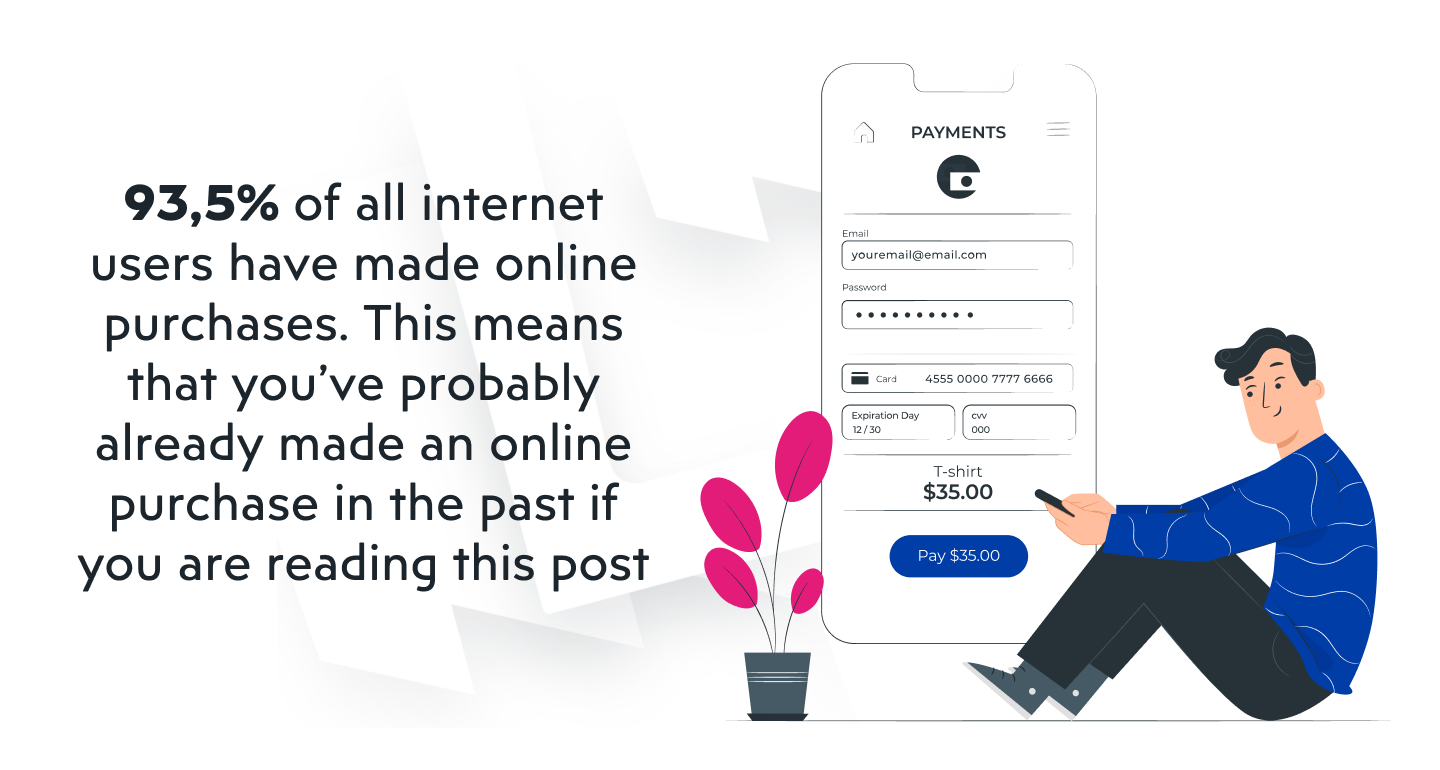
Regarding your choice of eCommerce platform, we know it’s hard to choose from a great number of platforms with each of them offering useful features. To make your choice a bit easier, here’s a detailed comparison of Magento eCommerce platform and its alternatives
We’ve found Pimcore to be an extraordinary platform for eCommerce merchants! If this is the first time you’ve encountered Pimcore, check out this article on using Pimcore for eCommerce!
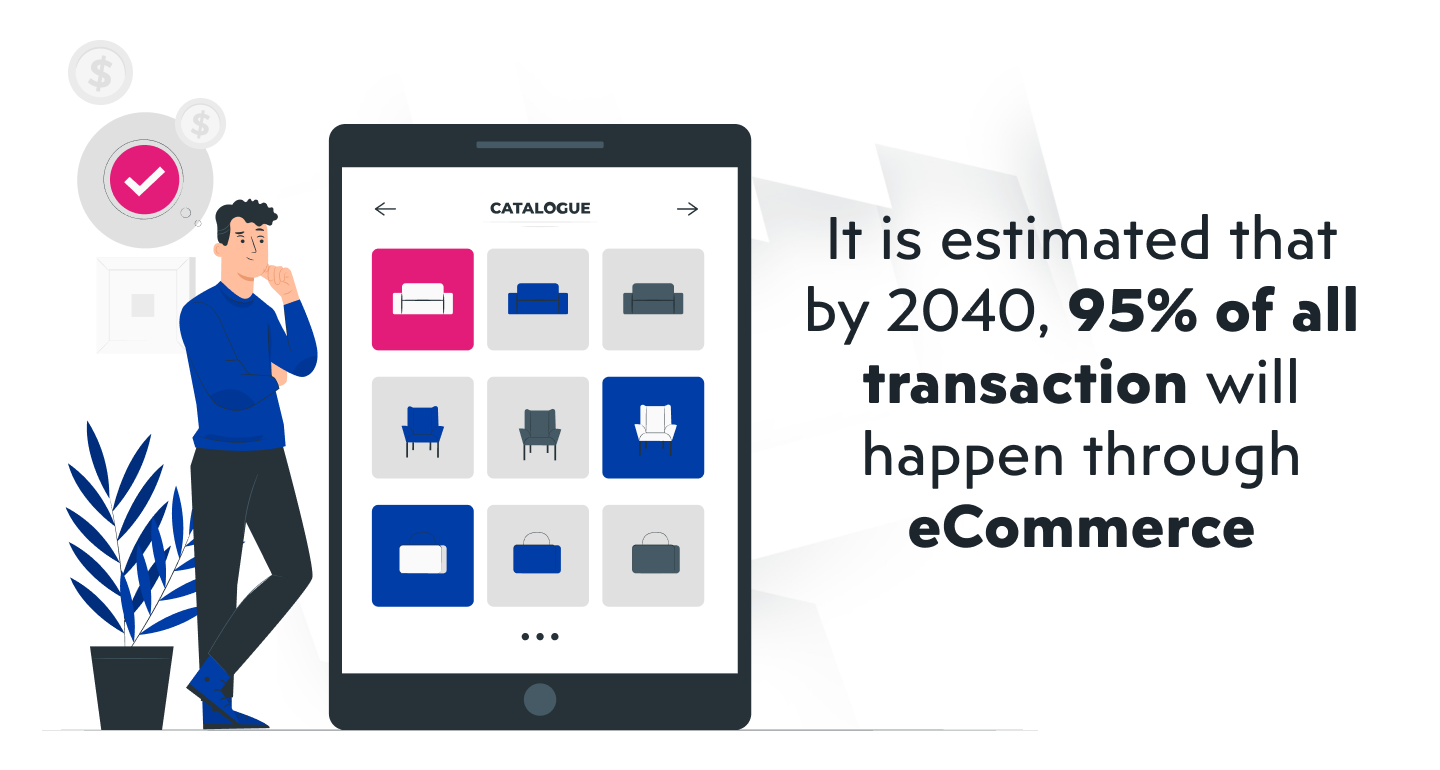
Pimcore’s digital products: Content management system (CMS)
To get exposure online you need to provide your business niche with high-quality content. It gets more complicated when you introduce different devices and platforms. When aiming to grow continuously, increase efficiency, or enhance the customer experience – you’ll benefit from connecting all processes, tools, and data into one single place.
CMS is software that helps you to do exactly that. In general, it enables its users to create, manage, and modify content on a website without needing some specialized technical knowledge.
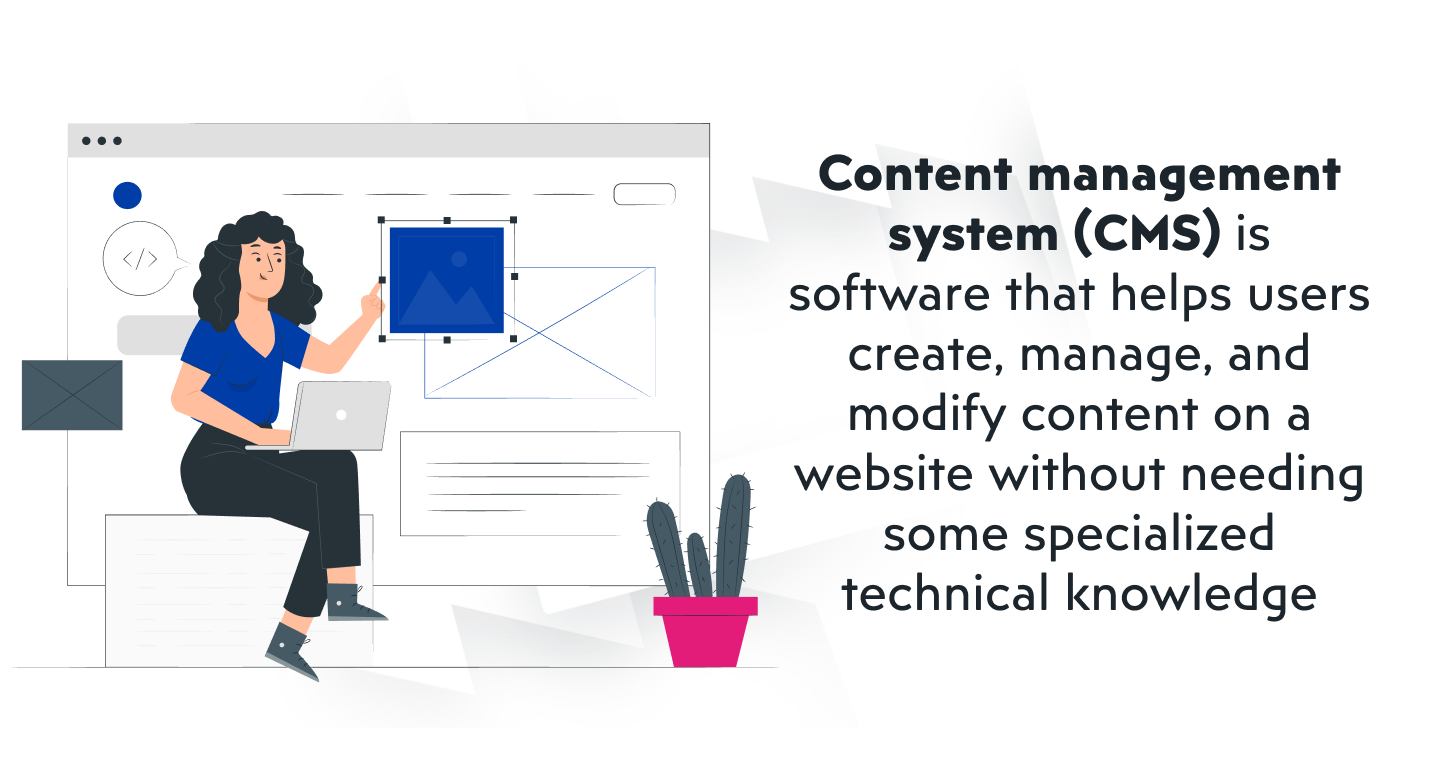
The most popular content management system today is still WordPress, but if you are looking for a platform that can provide you with strong content personalization and specific behavioral targeting capabilities, we highly recommend Pimcore.
Pimcore’s CMS has a framework for sophisticated marketing automation applications while also being entirely free, making it perfect for enterprises. Editors without any technical skills won’t have any trouble using the platform, all while the platform is recognized as extremely developer-friendly. Find out more on how Pimcore compares to WordPress and its alternatives,
Depending on the content management system it can have built-in templates. This allows content creators to know little to nothing about HTML and still provide high-quality content with images. Allowing your creators to do what they are passionate about: creating, and not focusing on the technicalities!
Scattered content among the organization can lead to content duplication or similarity. By implementing CMS content is consolidated into one centralized repository. This will encourage a collaborative environment in your company. Or in a bit simpler analogy – if you put musicians in a room full of different instruments, it’s highly likely that they will start to jam.
Benefits and features of CMS
Here’s a quick overview of the benefits of using Pimcore’s CMS:
- Control of data flow
- Reduced data error – caused by simple input errors or miscommunication (or lack thereof)
- Increased quality of your work environment
- Extensibility – add functionalities and make design decisions without having to work with any of the underlying code
- Flexibility – easily update your website at any time
- Customizable – create whatever you want, Pimcore’ CMS is fully customizable
- Media management – upload media content and embed videos into your content and you don’t need to work directly with your web server
- User management – control who can access your website and what can they do on your website (different levels of access)
- Version control – you have a clear view of the history of edits on your website
Pimcore has its own CMS solution integrated, enabling you to have all of the benefits of CMS technology while being completely free. But it gives you more options:
- Digitalization of marketing technology
- Multichannel marketing automation – for sales and marketing processes for the right audience
- Integration with any 3rd party platform – many different commerce systems are brought together without making any significant technological changes
- Merging commerce, content, and context – Pimcore CMS gathers real-time contextual data and customer behavior insights
- Improvement of ROI
- Better management of personalized experiences
- Create personalization in your apps – using Pimcore your business can create a personalized digital experience through analytics, behavioral targeting, data collection and user profiling. Improve your customer relationship management using this digital product!
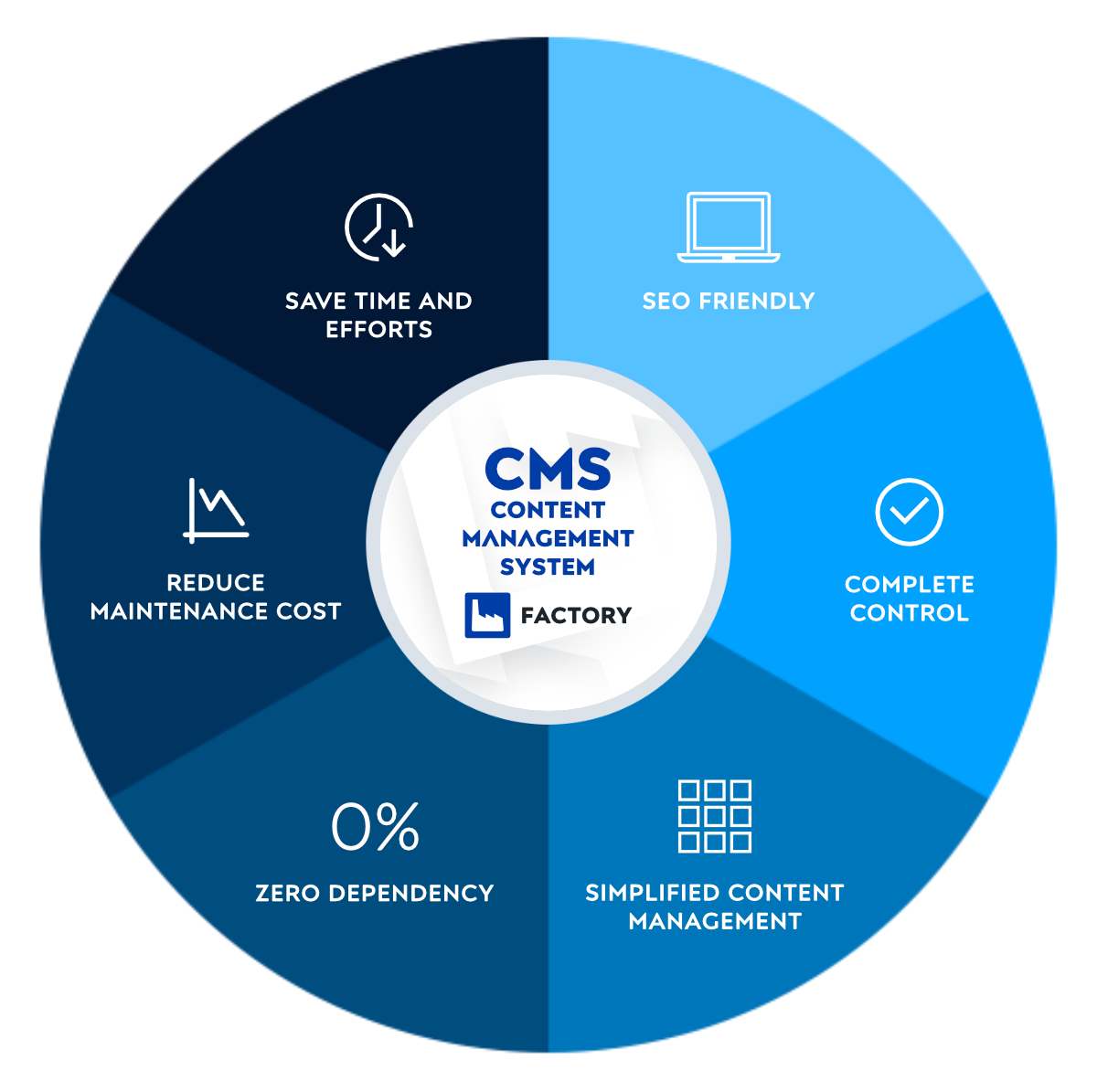
There is a lot to cover for Pimcore CMS! Such topic requires a lot more context and it has a huge potential. Luckily, we already wrote on that subject! Check out one of our latest article and find out everything about the best features of Pimcore CMS.
Pimcore’s digital products: Master data management (MDM)
In the current digital age, the volume of data for businesses is increasing on a yearly basis. The data is proving to be one of the most significant assets for any business, but increased volume of data can make your company’s data management more difficult. Now, how to handle it?
Let’s first take a look at the concept of master data!
Master data refers to the most useful information from your digital assets. It is the consistent and uniform set of identifiers and extended attributes that describes the core entities of the enterprise including customers, prospects, citizens, suppliers, sites, hierarchies, and charts of accounts. This can be across multiple IT systems and possibly beyond the enterprise to partnering businesses.
To manage your master data effectively, you will certainly need master data management (MDM) software.
Master data management tools allow you to secure your data across multiple platforms, making appropriate master data edits while eliminating redundancy, and keeping your data consistent across different departments.
This hugely improves your overall quality and accuracy of the data. Because of this effectiveness and usefulness of your data analysis is also increased which saves you money in the long run.
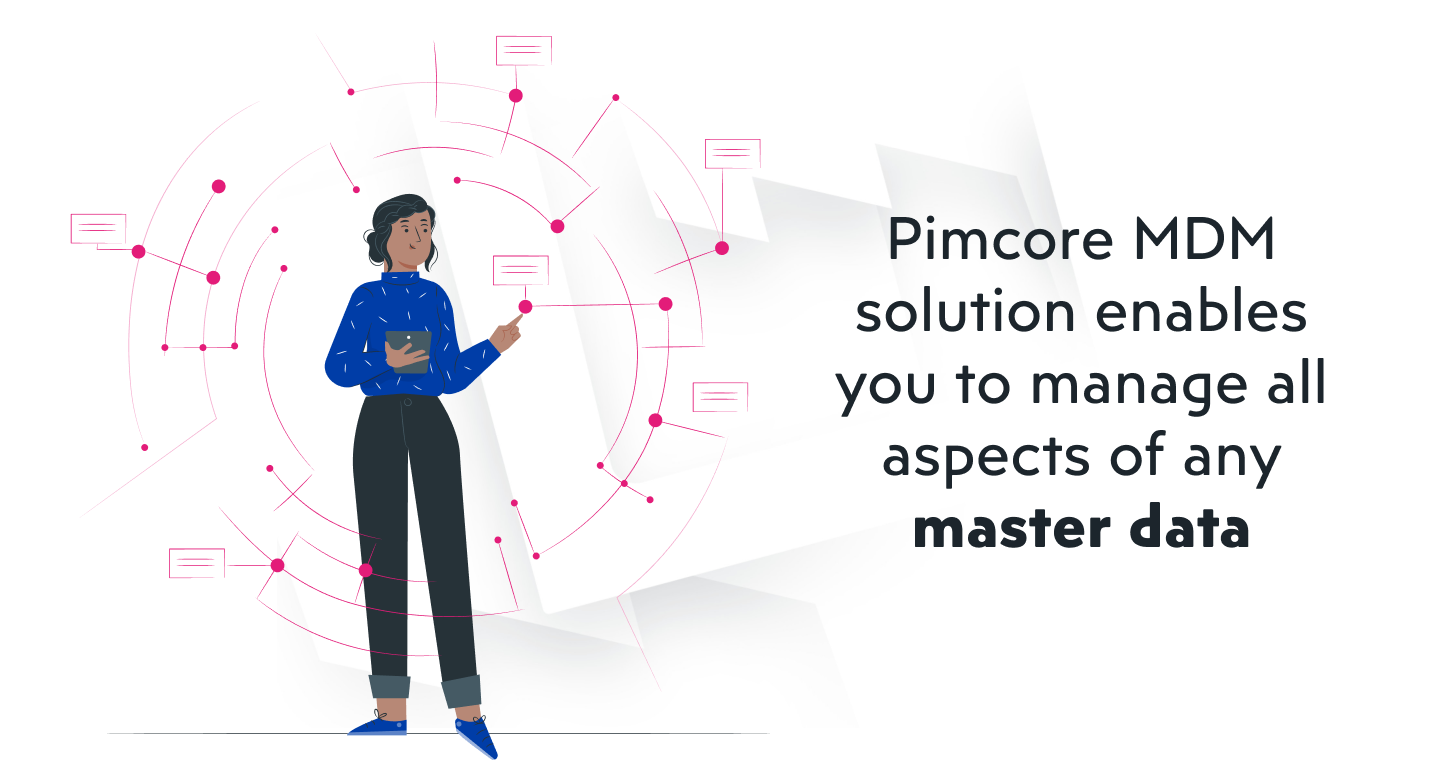
Currently, one of the most powerful open-source MDM solutions is Pimcore’s MDM software. In short, it enables you to consolidate master data across complex, heterogeneous system landscapes. In other words – manage all aspects of any master record.
Pimcore’s MDM software can be deployed both on-premise and cloud infrastructure. It has both basic and enterprise features. Some of the basic features are:
- Data modeling and management – data modeling is as flexible as possible with a web-based user interface and context-sensitive drag & drop operations. Data quality is enterprise-class with data governance that scales
- Omnichannel publishing – omnichannel publishing functionalities automatically supply all of your output channels with the right product information
- Apps and data integration – easy import and export of data between Pimcore and external systems.
But when you choose to go with an enterprise-level solution, be sure to expect more features, such as:
- Product experience portal – allows you to create a central marketing content hub with configurable portals for sharing and searching product information across departments
- Product data syndication – to capture your customers’ attention across markets and touchpoints with automated syndication to more than 2 000 sales channels and marketing platforms.
- Marketplace integration – integrate with marketplaces worldwide and track orders on a centralized dashboard
- Enterprise translation management and print publishing – automate the product information’s translation processes and print processes, keeping marketing and sales materials up-to-date on multiple languages
Integrating MDM into your business leads to:
- Improved time-to-market – GUI (graphical user interface) data modeling engine enables you to solve all your master data challenges. Its operational efficiency provides you with best time-to-market by:
- meeting governance
- risk management
- compliance requirements
- Accelerated digital transformation – open end to end structure that eliminates data silos
- Reduced cost – with better flexibility, scalability and security
- Completely flexible data models that can handle most complex data
- Easily manage millions of records with thousands of attributes
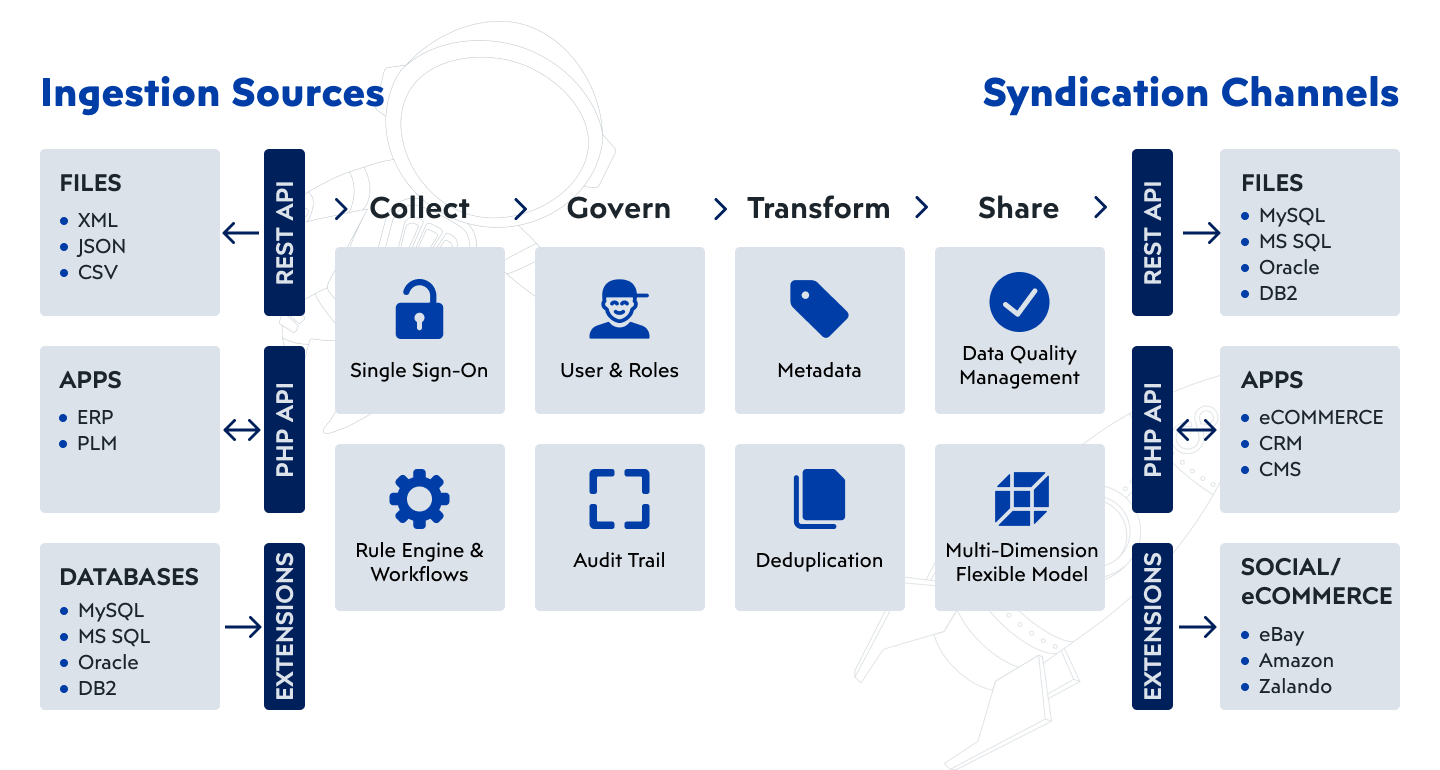
Want to know more about MDM and how can it be integrated into your business? Get in touch with us!
Pimcore’s digital products: Digital asset management software
Picture this scenario:
You are constantly being bombarded with overwhelming quantities of data and information in your company. You decide to invest in a storage platform (ex. Dropbox) that temporarily fixes your problem. You begin to slowly lose an overview of everything that is being distributed through your company. Before you know it, you have multiple storage platforms with scattered data which slows down your business processes.
The solution for your case can most certainly be the introduction of digital asset management software (DAM) to your business. DAM platform is designed to enrich, archive, version, organize, and distribute digital files.
More advanced implementations allow processes for production and distribution across multiple media and channels, giving you options for scalability and branding.
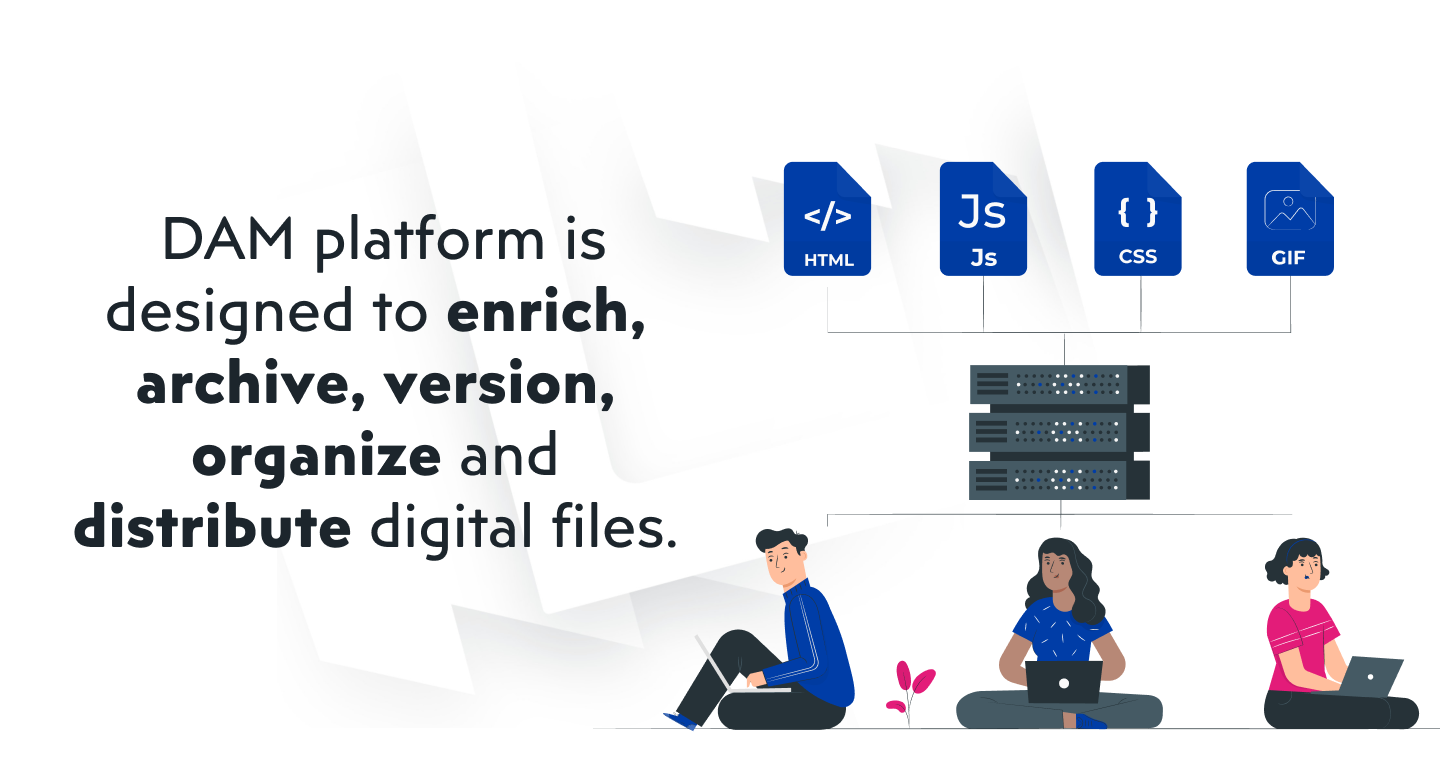
Pimcore has its own digital asset management solution which is far more than when it first meets the eye. Its digital media repository provides a solid structure for reusing digital assets, optimizing data dispersal and content search processes while offering high performance and scalability. DAM solution proves to be beneficial by:
- Escaping data silos – data silos are repositories of data fixed at a single location, usually in different departments of the company. Why are they bad for your company? Learn more about how data silos are slowing down your business processes in one of our latest articles.
- Achieving brand consistency – by streamlining your digital assets and eliminating inaccuracies and inconsistencies
- Providing seamless customer experience – by putting your customers at the center of your digital business and delivering uniform experiences across all touch points, you can optimize your customers experience in various buyers stages.
Features of Pimcore’s DAM system
What features does Pimcore DAM have to accomplish this? Here’s a quick overview of its basic features!
- File management – organize and store your files in a structured way
- Metadata management – enrich and categorize your files with metadata and tags to create a findable and meaningful asset collection for your business
- Image & video conversion – automatic conversion and transcoding to get the format you require
- Works with any file type
- Digital asset delivery – publish final versions of files to your CMS, webshop, or PIM and make Pimcore your central enterprise content hub
On the other hand, if your business is already operating at a high level, you may want to consider choosing the enterprise-level edition of Pimcore! Here’s a quick overview of features you’ll gain access to when using the enterprise edition!
- Asset experience portal – create branded portals for sharing and collaborating on files across departments and organizations
- Brand hub & asset sharing – share and collaborate on digital media with different public or private audiences in real time
- Enterprise print publishing – fully automate your print processes and keep marketing and sales material up-to-date
- Pimcore direct edit – connect Pimcore DAM with your local file system and seamlessly edit digital assets within your favorite applications
- Enterprise metadata – Pimcore features the DAM industry’s most sophisticated metadata definition components and data models
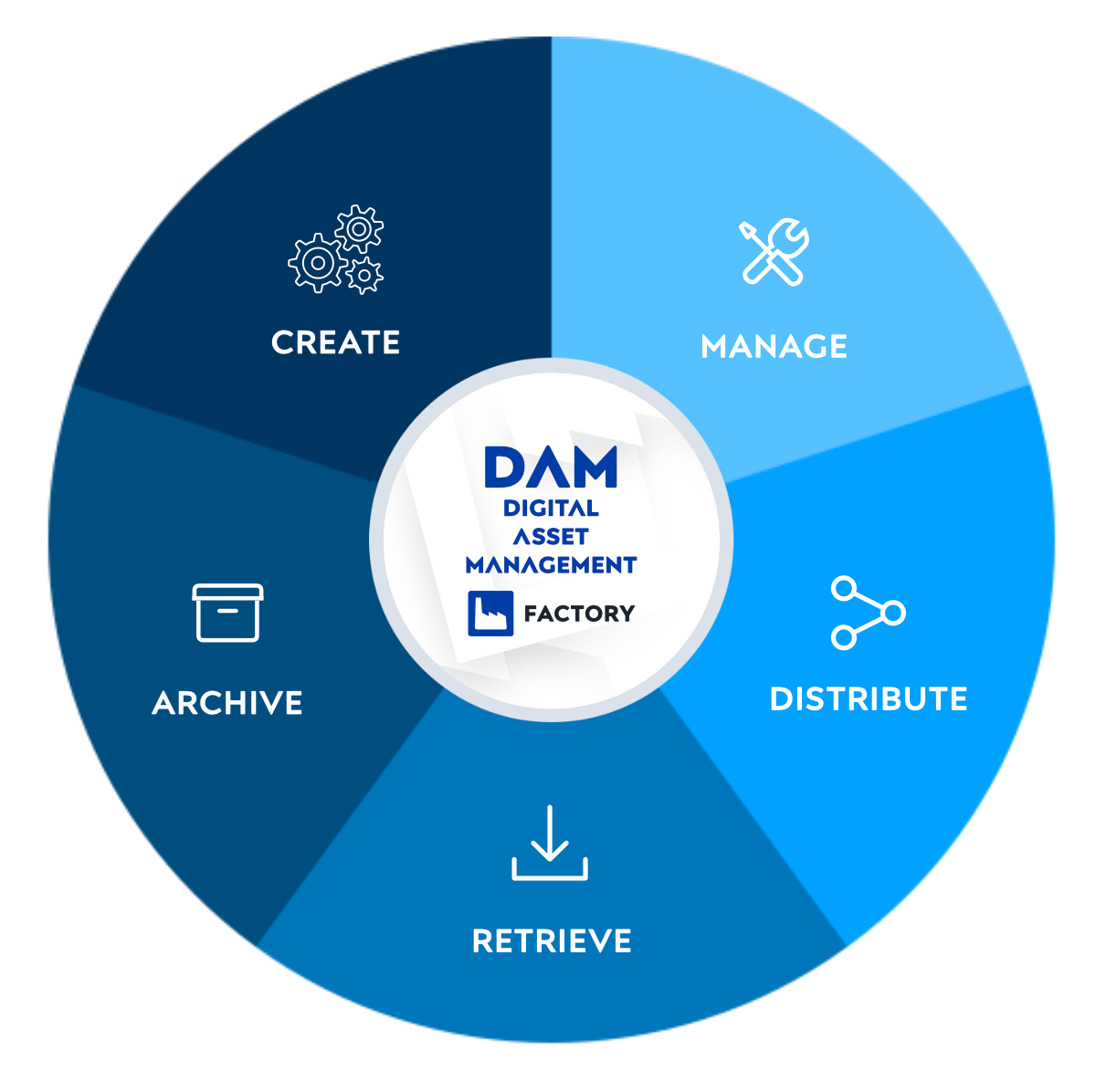
Pimcore’s digital products: Product information management
Are you handling huge amounts of product data?
If so, you have probably found yourself in a situation where managing data starts to become extremely complex. This is the tipping point at which you should consider a product information management (PIM) solution.
Product information management software can dramatically improve the quality and accuracy of your product data. This improvement enables you to boost the quality of your products and provide your customers with a unique product experience.
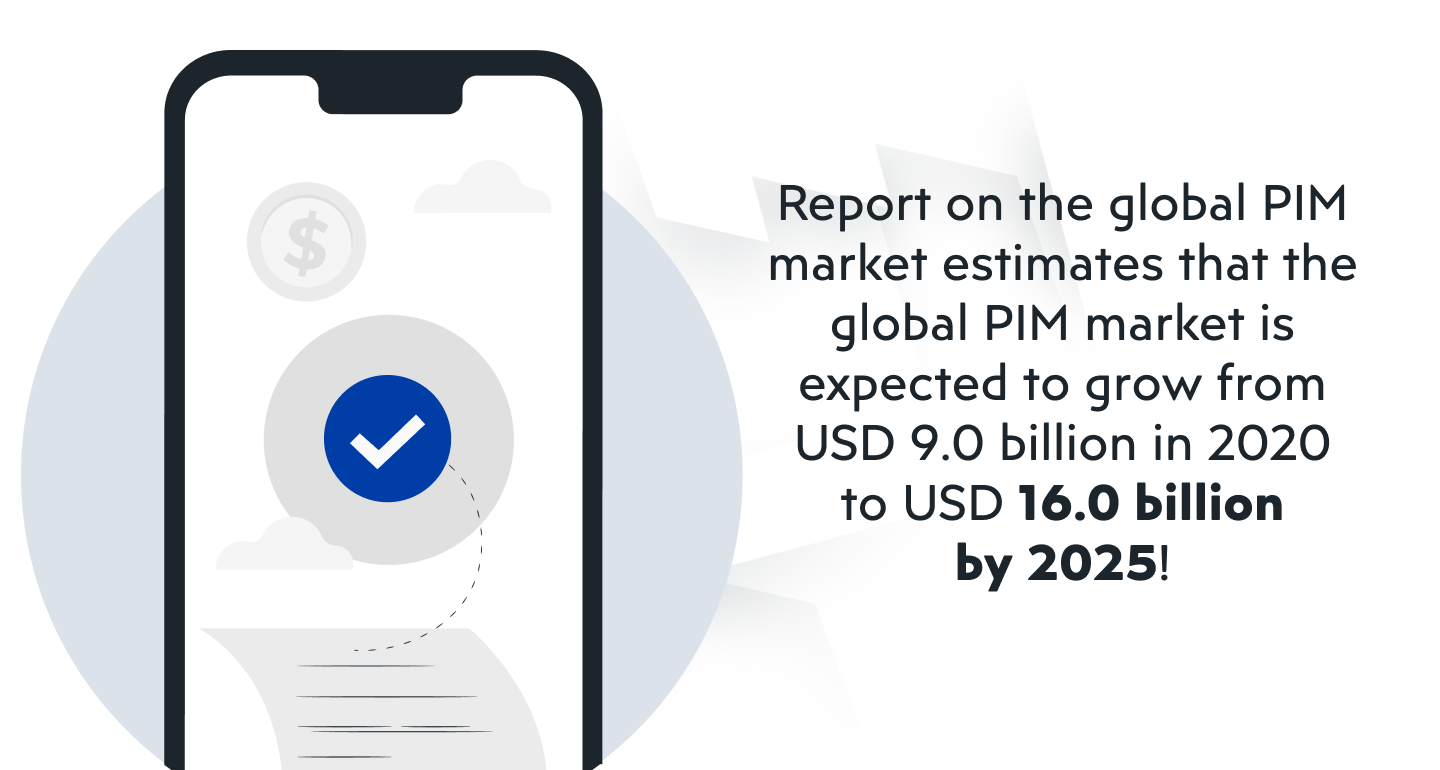
And regarding the PIM market, a report from MarketsAndMarkets estimates that it’s projected to grow to a staggering amount of USD 16.0 billion by 2025.
What type of data can PIM manage you might ask?
Product Information management software stores 3 main types of information:
- Technical information – product specifications which include material, size, color, etc.
- Emotional information – images, stories, and rich product descriptions (used to create emotional connections with buyers)
- Usage information – descriptions that provide the customers with information on how to use the product, where to use it, and some usage suggestions
This information can prove to be especially useful for eCommerce businesses by keeping track of all your product info and customer data. This will prove to be a valuable asset for your strategic initiatives.
Speaking of strategy, companies are increasingly focusing on the omnichannel business model. This is mainly because a company can make a more significant impact online if it’s present on multiple channels. And by allowing your customers to seamlessly switch between different platforms and still enjoy the same experience, companies are on a sure way to cement their brand into their customers’ daily lives.
With that in mind, Pimcore’s PIM becomes invaluable with its:
- Custom reports
- Enhanced data quality and management
- Creating and altering workflows
- Adaptability for enterprises – for many different departments, actions and levels of approval
- Synchronization of your inventory between online and physical stores with integrated customer data
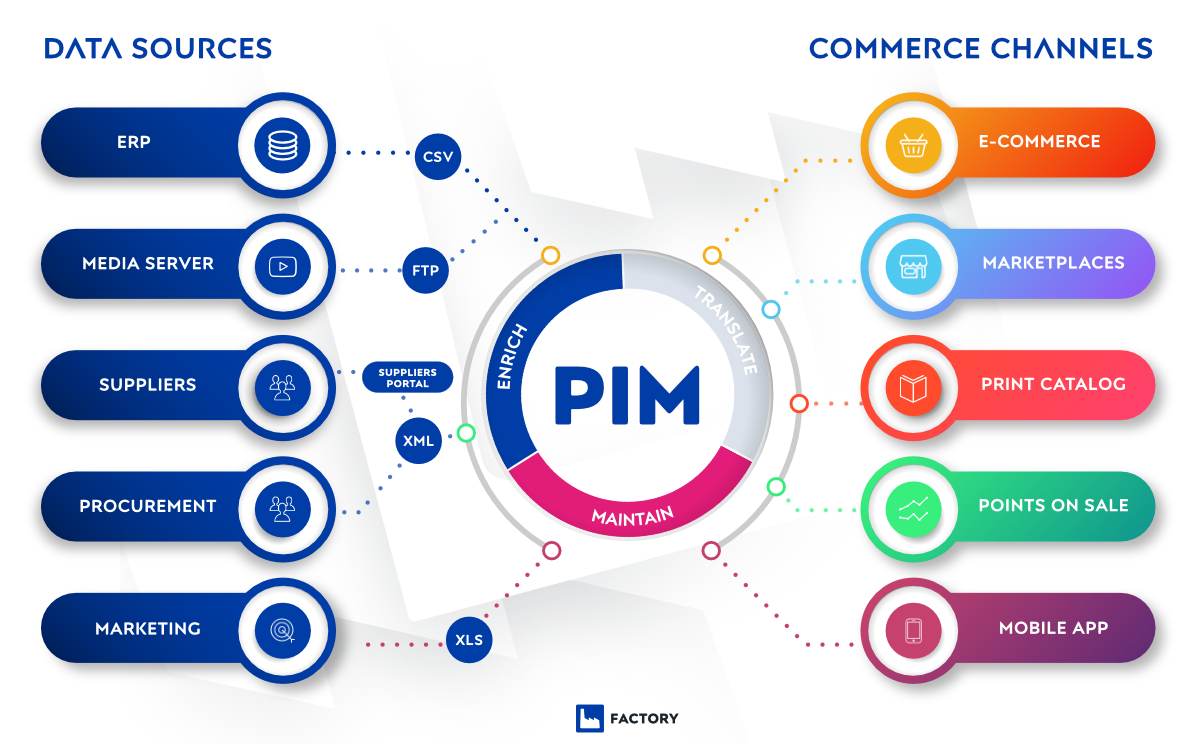
Want to know more about PIM and how can it be integrated into your business? Get in touch with us!
And if you’d like to know more about how Pimcore fares against other PIM systems, check out our Pimcore vs. Akeneo comparison article!
Pimcore’s digital products: Customer data platform(CDP)
With the rise of online businesses and increasing focus on online channels, enterprises are in need of a web-based interface built exclusively for marketers. This interface should be more analytical than CRMs are currently. Also, it should facilitate data collection, profiling, segmentation, and assist in taking actionable steps.
Such platform is necessary for the reason that marketing is continuously expanding and multichannel campaigns, and data integration are becoming an integral part of it.
Your marketing team can use the information to more effectively use your marketing budget. Of course, collecting this data and properly managing it can be a hassle if you don’t have the necessary tools.
Customer data platform (CDP) is a perfect tool for any marketer. In essence, it is a database software used to analyze customer data.
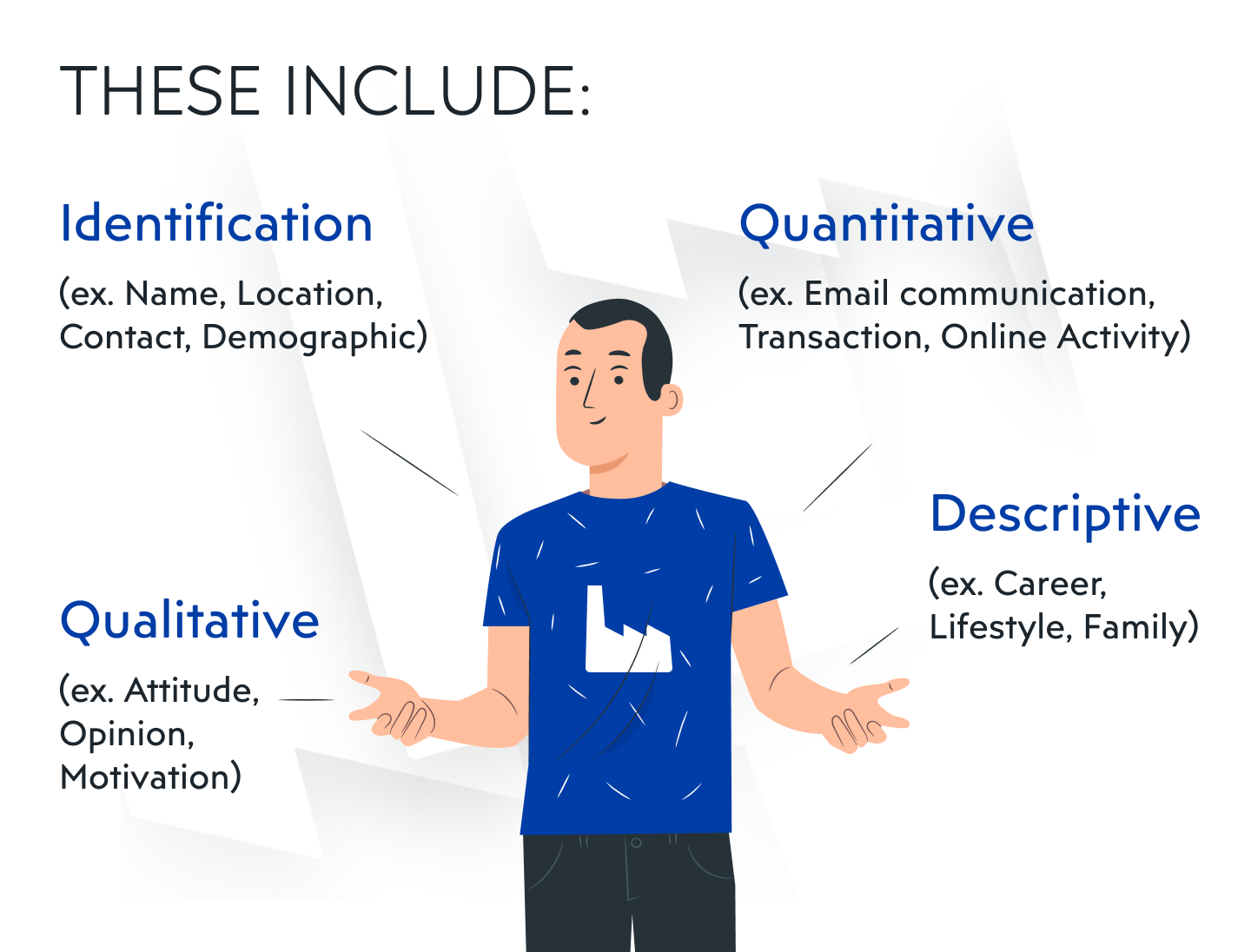
With high-level personalization and targeting engine, and incredible customer data management capabilities, Pimcore’s CDP allows for :
- Creating different targeted audiences, segments, groups
- Automation – Automate any actions connected to customers according to rules you set
- Profile Unification – merging various devices into a single individual when identified
- Customer data integration and modeling – no matter if it’s online or offline, first-party or third-party you can aggregate, store, and model data about your customers.
This software solution is primary for marketers, as they can make the most use of this data. So, check out our detailed article on Pimcore’s CDP and how to make smarter marketing campaigns! If you’re new to either Pimcore or CDPs, you’ll find the article extremely useful!
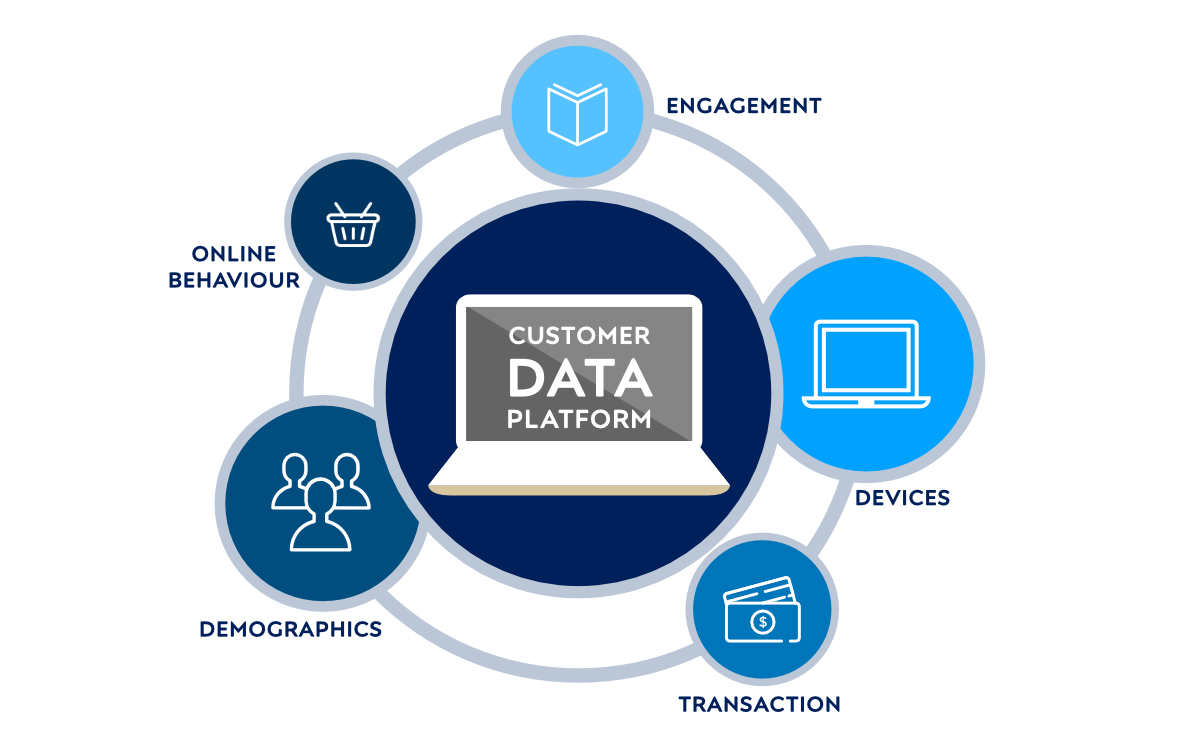
You’re looking for a digital product for your business?
We went over a few different digital products to start or enhance your online business. Throughout the article, we covered different solutions that cover different functions for a variety of departments:
- eCommerce module as a base for your online business
- Content management system (CMS) to organize your content in a better workflow for multichannel publishing
- Master data management (MDM) to secure your most valuable data on multiple platforms
- Digital asset management (DAM) to have all of your assets centrally managed, escaping data silos
- Product information management (PIM) for all data related to your products
- Customer data platform (CDP) as a perfect tool for your marketers
We briefly reviewed each product of the Pimcore platform, but we strongly encourage you to check out our Pimcore knowledge base to find more interesting and useful information on this extraordinary platform!
And if you’re in need of a reliable solution partner, we’d happily help! We’re experts in Pimcore development and currently, we’re one of few Pimcore Gold partners! If you have an idea on starting your new business or improving your current one – let’s talk!